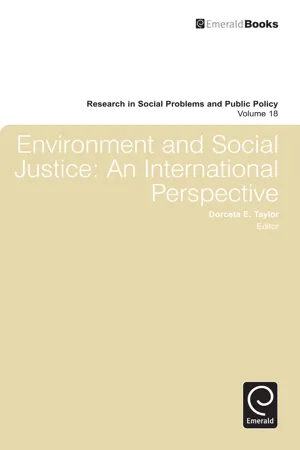
eBook - PDF
Environment and Social Justice
An International Perspective
- 504 pages
- English
- PDF
- Available on iOS & Android
eBook - PDF
About this book
This volume examines domestic and international environmental issues from an environmental justice perspective. The book is a compilation of original research articles and is divided into six parts. Articles in Part I focus on urban environmental issues and sustainability including Central Park's influence on historical and contemporary models of funding public parks, London's community-based efforts to deliver affordable fresh food to the poor and the relationship between sustainable living, green consumption and social justice concerns in an ecovillage in New York. Part II concentrates on water resources and the hazards of toxic fish consumption. Part III features food security, agriculture and land loss. Energy and the theme of land and resource loss in host communities is the focus in Part IV. It discusses the poverty that is pervasive in communities hosting extractive oil and gas installations and the industry and attitudes towards it in rural Trinidad and Nigeria. Part V employs spatial analyses techniques to examine siting and toxic releases and Part VI examines diversity and environmental attitudes and presents findings of national studies and environmental conflicts.
Frequently asked questions
Yes, you can cancel anytime from the Subscription tab in your account settings on the Perlego website. Your subscription will stay active until the end of your current billing period. Learn how to cancel your subscription.
No, books cannot be downloaded as external files, such as PDFs, for use outside of Perlego. However, you can download books within the Perlego app for offline reading on mobile or tablet. Learn more here.
Perlego offers two plans: Essential and Complete
- Essential is ideal for learners and professionals who enjoy exploring a wide range of subjects. Access the Essential Library with 800,000+ trusted titles and best-sellers across business, personal growth, and the humanities. Includes unlimited reading time and Standard Read Aloud voice.
- Complete: Perfect for advanced learners and researchers needing full, unrestricted access. Unlock 1.4M+ books across hundreds of subjects, including academic and specialized titles. The Complete Plan also includes advanced features like Premium Read Aloud and Research Assistant.
We are an online textbook subscription service, where you can get access to an entire online library for less than the price of a single book per month. With over 1 million books across 1000+ topics, we’ve got you covered! Learn more here.
Look out for the read-aloud symbol on your next book to see if you can listen to it. The read-aloud tool reads text aloud for you, highlighting the text as it is being read. You can pause it, speed it up and slow it down. Learn more here.
Yes! You can use the Perlego app on both iOS or Android devices to read anytime, anywhere — even offline. Perfect for commutes or when you’re on the go.
Please note we cannot support devices running on iOS 13 and Android 7 or earlier. Learn more about using the app.
Please note we cannot support devices running on iOS 13 and Android 7 or earlier. Learn more about using the app.
Yes, you can access Environment and Social Justice by Dorceta E. Taylor, Ted I. K. Youn in PDF and/or ePUB format, as well as other popular books in Politics & International Relations & Political History & Theory. We have over one million books available in our catalogue for you to explore.
Information
Table of contents
- Front cover
- Research in Social Problems and Public Policy
- Copyright page
- Contents
- List of contributors
- Part I: Open Space, Gentrification, Food Security and Sustainable Living
- Part II: Water Resources and Toxic Food Consumption
- Part III: Agriculture, Land Loss and Genetically Modified Crops
- Part IV: Energy - Oil and gas Exploration
- Part V: Spatial Analysis
- Part VI: Perceptions, Attitudes and Diversity
- Concluding remarks